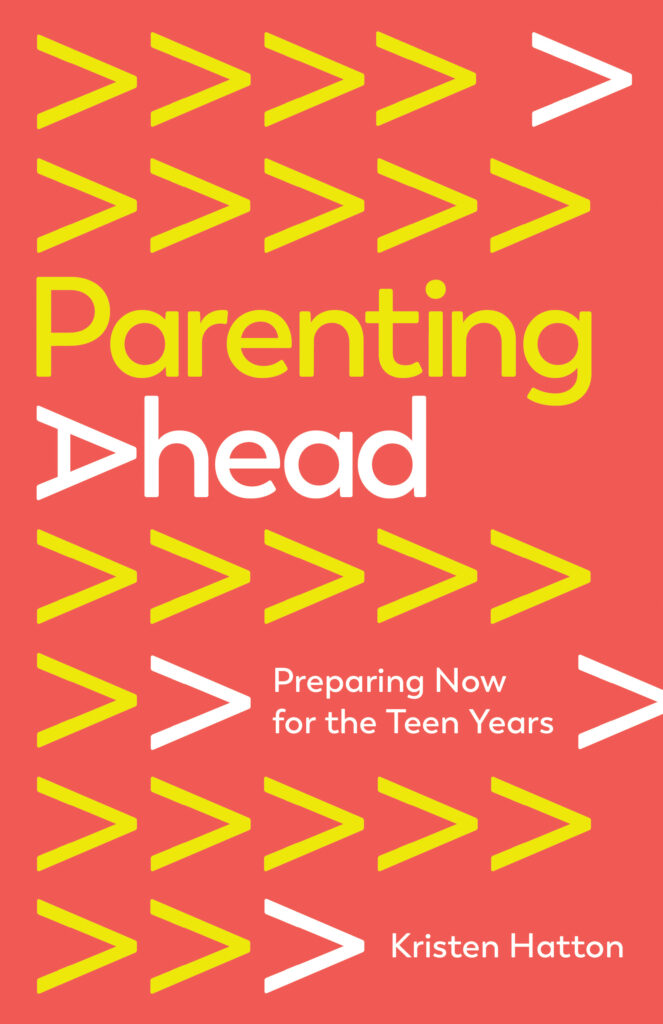For many parents, the mere thought of the teenage years fills the heart with dread and fear, but it doesn’t have to be that way. In Parenting Ahead: Preparing Now for the Teen Years, Kristen Hatton helps parents of young children lay the groundwork so that having honest conversations, setting reasonable limits, and exploring issues of the heart become a part of the family culture, preparing both them and their children for the next stage.
Parenting Ahead helps parents with younger children build this foundation for their family based on biblical principles. Readers will learn to practice redemptive parenting where their children grow to see the world through a gospel lens based on biblical truth. A counselor to teens and parents, Hatton helps moms and dads make that connection between their current parenting and future outcomes. By evaluating their parenting, they will see where their own fears, desires, and insecurities lie and how to pivot to practices of faith and trust in God. The redemptive approach to parenting will help parents and children be better prepared for engaging in the realities of peer pressure, decision-making, and recognizing the connection between behavior and the heart.
In the following interview, we talk more to Kristen about Parenting Ahead and what it means to parent redemptively.
Q: What are some of the biggest fears parents have about parenting teens?
What I often hear and worried about myself with teens were the choices they would make, the influence of their environment, and who their friends would be. We worry about our kids being left out, not performing well, making a team, and we are concerned for their safety. Will they hold fast to their faith? Did we do enough? Are we doing what we should as a parent? These are some of the questions swirling around in our minds. When they are little and under our feet, we feel somewhat in control, but when they start forming their own friends and plans, then start driving, we realize how little control we really do have. That can bring on a lot of anxiety.
In Parenting Ahead, I address such fears but come at it from what may be an unexpected angle. First, I spend chapter two laying out a theology of hope. This may not seem very parenting focused, but knowing why Jesus is our hope and how he sustains us is foundational for us as Christians, as parents, and as the primary spiritual leaders of our children. However, to move from hope feeling like an empty platitude to becoming our very lifeline, we must know the person of Jesus—his work and worth for us as Savior, Redeemer, and Friend. That knowledge becomes the anchor of hope to hang our hat on when fear wells up.
In Part Two of the book, I spend time addressing our parenting idols. An idol is anything apart from God that rules our hearts, and fear is often underneath the idols common to parents. In other words, we are ruled by the idol of control because of fear. Safety and people-pleasing can also become ruling idols driven by our fears. Ultimately, we aren’t in control, and our fears may transpire, yet what do we read throughout Scripture? The most repeated command in the Bible: “Do not fear.” But how is this possible? Only by God’s grace and influence in our lives.
Q: What does a long-range, proactive approach to redemptive parenting look like?
It might be helpful if I explain the term redemptive parenting as a launching point. Redemption is a slave market term where a redemption was the price paid to set a slave free. It means to purchase out of bondage. Therefore, to be redemptive is to save someone from error or evil. This is why Jesus is called our Redeemer. His perfect life and substitutionary death were the redemptive actions necessary to purchase us out of slavery to sin and into life with him. His goodness to the guilty is how I explain grace. Taking this concept into the context of our homes and our relationships, I would say to live redemptively is living compelled by grace. When we give grace to one another, we reflect the heart of Jesus because we are not demanding someone pay for their sins. So, living redemptively is living out the reality of the gospel with one another through confession, repentance, forgiveness, and grace.
I liken a long-range, proactive approach to redemptive parenting to the life of a farmer. James 5:7–8 says, “See how the farmer waits for the precious fruit of the earth, waiting patiently for it. You also be patient. Establish your hearts . . . ” A lot goes into producing crops. It is long, slow work of tending to the soil, watering, fertilizing, proactively working to get predators out, and waiting to see the results. Good, healthy crops don’t just happen. There are also things outside the farmer’s control—like the weather. But day in and day out, he goes to work, patiently tending and waiting. It’s no different with parenting. It takes intentional, ongoing work. Steadfastness and commitment, even without immediate results to show for it. But how did James say we are to endure? We are to establish our hearts by feasting on God’s Word and standing firm in his truth. For apart from his grace and truth, we will be easily overcome with discouragement, exhaustion, false beliefs, the ways of the world, peer pressure, and the temptation to take an easier path. We would lose sight of the day-in and day-out opportunities with our kids that are constantly before us.
Q: What suggestions do you have for truly listening to your kids when they try to communicate with you, without minimizing their feelings or leaping to platitudes? Do our kids always need us to be in “fix it” mode?
Our kids definitely don’t want us to always be in fix-it mode. Most of the time, they simply want to be listened to. I know this from my own daughter. She did not always experience me as safe to talk to because I didn’t know how to just enter into conversation with her without making her feel like I was shutting her down. She felt like she was a project on my to-do list or that she was incapable of success without my intervention.
Coming about it the hard way, I’ve learned to connect intentionally as opposed to being distracted by multitasking. Active listening and identifying as a fellow sinner are key. We also need to be willing to sit in sadness and not hurry hurt. By and large, we are uncomfortable with “negative” emotions, but when we throw out platitudes, we minimize and dismiss the feelings of our children, making them not want to open up with us.
Q: In what ways do both overparenting and under-parenting bring about unintended results? You write that there’s no perfect formula to parenting, but can you share some helpful guidelines for finding balance between the two ends of the spectrum?
Let me first explain what I mean by both overparenting and under-parenting. Overparenting could be synonymous with helicopter parenting. Parents in this category tend to be warm, supportive, and responsive, which is great, but when these qualities are coupled with a high level of control, parents exhibit too much responsiveness and overinvolvement for what is appropriate for their child’s age.
My use of the term under-parenting does not mean neglectful or uninvolved parents, but rather overly permissive parents. These parents are also warm and responsive. Their desire is for their kids to be happy, and they want to have a good relationship with them. But with these goals, permissiveness is exhibited through failure to exert parental authority, set and enforce limits, and an overall abdication of shepherding their kids.
It is interesting that though these parenting styles are very different, research shows that the young adult children from both these types of parents struggle in the same ways—anxiety, depression, low self-efficacy, dissatisfaction, and entitlement, to name a few.
I discovered the commonality when I was in a counseling research class and got curious about a mitigating link between helicopter parents and permissive parents that was leading to the developmental challenges of young adults. My hypothesis was that fear was the common link. Of course, fear will look very different between the two types of parents. Helicopter parents fear anything that might cause adversity in their children’s lives, whereas permissive parents may fear their children not liking them, among other things. In addition to fear, or maybe beneath the fear, I see both parents fall into maladaptive thinking patterns or wrong thinking. Just as our kids create false narratives in their heads about what is true, so do we as parents—and when those narratives become more real to us than God’s Word or what is really happening, our idol of fear can escalate.
Rather than looking for some perfect balance between hovering and permissiveness, at the core of what I address is seeing our need for Jesus when we struggle with fear, the temptation to control, or the desire to be the cool parent. Parenting starts with our hearts, and what we do will flow from it.
Q: Why is it important to be honest with our children about our shortcomings and sins?
If our children do not see that Mom and Dad need a Savior too, they will never feel like they can be honest about their sins. They will either think we have it all together and feel judged because they can’t measure up, or they will see us justifying our sin or sweeping it under the rug, viewing us as hypocrites. But when our children see the pattern of redemptive living modeled for them (including confession, repentance, forgiveness, and grace), they will learn they can be honest about their sin too.
Furthermore, not only how we handle our sin but also our children’s sin paints a picture for them of who God is. Is he an angry policeman in the sky looking to bust us or a friend to sinners who calls us to come?
Q: What is one single piece of advice that you give new parents who are just starting out on their parenting journey?
The road is long and hard. You will not get it all right, and that’s okay. In fact, if I could free you from thinking you have to be the perfect parent or that you even can be, I would. Rather, know that God loves your children even more than you. And he uses all things, even our sin and struggles and our children’s sin and struggles, to bring us to greater dependence on him. And as for the parenting road ahead, my hope is that by his strength you would be able to patiently endure and intentionally shepherd your children.
parenting Ahead: Preparing Now for the Teen Years
Parenting Ahead helps parents with younger children build a foundation for their family based on biblical principles for the teen years to come. Readers will learn to practice redemptive parenting where their children grow to see the world through a gospel lens based on biblical truth.






